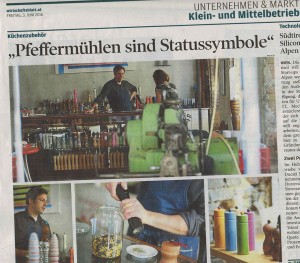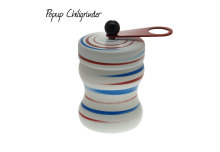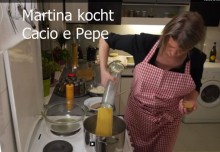Claudia Peintner writes in the Wirtschaftsblatt June 2016 about WauWau
"Pepper mills are status symbols".
A Viennese company competes with the Peugeot car group in the field of spice mills: both produce pepper mills in the high-price segment. WauWau's sales recently rose by a third.
Vienna. "What would life be without a pepper mill?" reads a sign above the store entrance of WauWau. Thomas Kreuz from Vienna has been designing and producing pepper mills with his company since 2000, and chili mills for the past two years. On display are classics made of natural wood, pink or green lacquered ones, ones with a Sisi motif or in the shape of a lighthouse.
"A woman came by a long time ago and told me that her friend collects pepper mills and is getting married in a lighthouse," reports the trained goldsmith. That's how the lighthouse pepper mill came about as a wedding gift, which is now also selling well in series: "Maritime motifs are in demand right now," says the sole proprietor from the seventh district. Just like handicrafts in general.
30 percent sales growth was reported by Kreuz over the past two years, without providing details on the results. "There is a trend in a certain group of buyers toward quality and durability. People want to know where and how something is produced." And, "Pepper mills are a status symbol. People spend more money on them than is necessary."
In the range, the Viennese has about a hundred different models of spice mills. Depending on the size and model, they cost between €52 and €368. WauWau sells 2000 pieces per year. 20 percent of them via the Internet, the rest in stores and through a handful of dealers. Kreuz knows that his kitchen utensils with St. Stephen's Cathedral or Mozart motifswould also fit well in a souvenir store. But additional sales channels are not an issue: "If I sell the mills through dealers, they need high margins, I'm left with less."
Grinder instead of shotgun
The Viennese prefers to stay small with his manufactory and tinker with new business ideas. For example, Kreuz also developed a nutmeg mill and named it after the 1950s song "Polly Molly". He sells homemade lemon pepper from the apothecary jar in the store and is thinking about how he can tie production even more closely to Austria. The wooden turned parts for the spice mills are made by the turner around the corner (the metal turned parts, note TK) and further processed in the workshop in Lower Austria. Kreuz punches the grinder for the chili mill itself in the Vienna showroom. The pepper and salt grinders are still imported from a Swiss family business. That is to change by the end of the year: Kreuz points to a green piece of equipment standing in the 40-square-meter store space: "I just bought this pusher planer. It used to be used by a German gunsmith to make shotguns and is now being repurposed for grinders."
Growth driver chili
Originally, Kreuz studied product design at the University of Applied Arts and is a trained goldsmith. The creative streak of the mill producer is also noticeable in the design of the showroom. Drain pipes have been converted into ceiling lights, and in the shop window a skateboard serves as a storage surface for the spice mills.
 He chose the name WauWau as a brand because it is short, typically Austrian and every child can remember it, the sole proprietor says. "If you search the name on the Internet, my pepper mills come first, then the dog clubs."
He chose the name WauWau as a brand because it is short, typically Austrian and every child can remember it, the sole proprietor says. "If you search the name on the Internet, my pepper mills come first, then the dog clubs."
A quarter of the WauWau spice mills are shipped abroad. For example, Kreuz made pepper mills that look like the Frankfurt TV tower(StuttgartTV tower, noteTK) for the tourism association of the city of Frankfurt am Main(Stuttgart, note TK). In addition to Germany, customers include Switzerland, the United States and Asian countries. "My advantage is that there are few quality manufacturers worldwide," says the Viennese. Along with WMF and Zassenhaus, the French automotive group Peugeot is one of the largest and oldest spice mill manufacturers.
Kreuz sees growth potential for his business above all in chili mills, which already contribute 40 percent of sales. On the one hand, more and more people are preparing chilies themselves. On the other hand, the Austrians are among the leaders in Europe in terms of sharpening. Not to be compared, however, with Korea, where only chili is used for seasoning instead of pepper, as Kreuz reports. Peak sales time for spice mills is around Christmas. When things are a little quieter in the store, one thought never leaves the sole proprietor's mind: "I would like to make sure that there is a Pepper Day once a year. And the following week, Chili Day."










